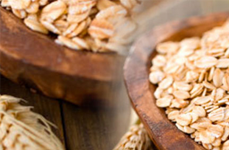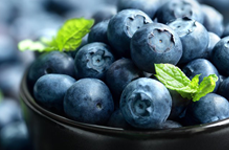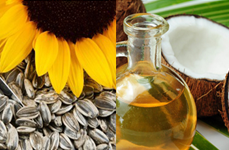How often do you think about the health of your gut? If you wait until you have a digestive disturbance to think about it, there’s a better way. Optimizing your gut health will not only improve digestion and help eliminate digestive concerns, it will also help you get the most nutrition out of everything you eat, which can help you be healthier overall.
Next to probiotics, two of your greatest allies for keeping your gut healthy and your digestion optimized are prebiotic supplements and digestive enzymes. Here's the difference between the two and how they help.
The Flora in Your Gut
Before we get into prebiotics, let's talk about the microbiome of your gut. Trillions of bacteria live in your digestive tract—researchers estimate about 1 to 2 pounds worth of bacteria is in your digestive tract at any given moment. There are both good and bad bacteria there, and the goal is to make sure the good outweighs the bad for optimal microbiome health.
Eating a diet rich in real foods, along with some fermented probiotic foods, is a great way to help maintain that balance. You can also help the good microbes flourish by taking probiotics supplements, prebiotics, or both. Probiotic supplements help reinforce good gut flora, delivering beneficial microbes right where you need them most. But what about prebiotics?
What are Prebiotics vs. Probiotics?
We often compare probiotics and prebiotics to a garden. Adding probiotics is like adding more plants to your garden, and adding prebiotics is like fertilizing your garden. Prebiotics are a type of dietary fiber that helps feed and stimulate those good microbes.
Not all dietary fiber makes an effective prebiotic, although high intakes of dietary fiber in general offer many other benefits, especially for the heart and digestive system, and it can help with weight management. To be classified as a prebiotic, dietary fiber must be able to resist breaking down and being absorbed in the upper gastrointestinal tract so that it can reach the intestines, then it must selectively stimulate only the good microbes there.
Foods naturally high in prebiotic fiber include leeks, asparagus, chicory, Jerusalem artichokes, garlic, onions, wheat, oats, and soybeans. But if prebiotic foods aren't on your menu every day, which is often the case with modern diets, a prebiotic supplement can help. You can also get the best of both in a combined probiotic supplement with prebiotic fiber.
Prebiotic Benefits
Prebiotics benefit your body by giving the good bacteria in your gut the nourishment it needs to thrive, which can support other health improvements too. A healthier gut means better digestion, nutrient absorption and fewer gastric disruptions. But the benefits don't stop there, because improved nutrient absorption means your entire body gets more of what it needs for health and wellbeing.
Some of the benefits of prebiotics include:
• Boosted immune health
• Easier digestion & fewer digestive concerns
• Improved nutrient absorption & metabolic health
• Stronger bones due to improved calcium & magnesium absorption
• Less stress and better sleep due to improved absorption of brain-supporting nutrition
What are Digestive Enzymes?
An enzyme is a type of protein within cells that create chemical reactions. The body makes many types of enzymes that help perform different tasks like removing toxins from the body, building muscle, digesting food and more. Digestive enzymes are essential because they help turn the food you eat into molecules your body can use for all its necessary functions.
There are three primary enzymes related to digestion: amylase, protease and lipase.6 Amylase, produced in salivary glands, the pancreas and the small intestine, breaks down carbs and starch. Protease (a type of enzyme that includes pepsin and trypsin) is made in the stomach, pancreases and small intestine and helps digest proteins.6,7 And lipase, also made in the pancreas and small intestine, breaks down fats and oils.
There are other digestive enzymes too—including lactase, which helps break down milk sugar or lactose—but the three above are key players.7
Digestive Enzyme Health
Several factors can impact our digestive enzymes. The food choices you make can either help or hinder enzyme production, and certain foods (mostly fruits and vegetables) actually contain some digestive enzymes.6 Other foods and beverages (including alcoholic beverages) can alter the pH of the stomach or intestines and reduce digestive enzymes. Also, some health concerns and prescription medicines, like antibiotics, can reduce digestive enzymes.
When the enzymes in your body are affected, in the long term your health can be affected too. Sticking to a whole food diet focused heavily on real, plant-based ingredients is ideal for supporting healthy digestive enzymes, but if your digestive enzyme production isn’t as good as it should be, digestive enzyme supplements may help.
What Do Digestive Enzyme Supplements Do?
Digestive enzyme supplements help reinforce the enzymes in your body to improve digestion. You can choose specific enzymes to support digestion of particular foods.
For example, if you have trouble digesting dairy, you might consider taking a digestive enzyme supplement that contains lactase, like Swanson Ultra n-zimes Dairy, formulated specifically for those with difficulty digesting dairy products.
If you want to help boost your body’s protein digestion, try a digestive enzyme supplement with protease, like Swanson Full-Spectrum Enzymes BioCore Optimum Complete, which is especially popular among people on a high-protein diet or keto diet plan.
Other digestive enzyme supplements work double duty to help maintain gastric pH, like Hydrochloric Acid w/Pepsin, which contains pH-promoting betaine hydrochloride and the digestive enzyme pepsin.
A Healthier Gut Means a Healthier You
Whether you reach for probiotic supplements, prebiotic supplements, digestive enzymes, all three, or simply refocus your diet and lifestyle to nourish your gut health, it’s well worth the effort. Improving your gut health can have long-lasting benefits that affect the health of your entire body, helping you derive more nutrients from your food, have better immune health, and much more.























LEAVE A COMMENT :
Comments sort : Newest / Oldest / Most Upvoted